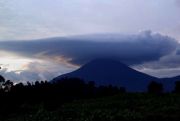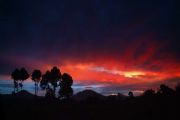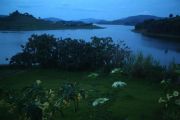Uganda is relatively safe and well prepared for tourism, although recent bad press might have deterred travellers from visiting the country. It is much smaller than most of its neighbours, but it has plenty to offer.
|
 |
 |
 |
 |
 |
 |
 |
 |
Kisoro (one of the Virungas)
 |
 |
I wasn’t considering going to Uganda myself. This was until I met a bunch of people travelling overland in a truck. They were raving about many qualities of this evergreen state, about its welcoming and friendly people, superb national parks where chimpanzees and mountain gorillas could easily be visited, about the chain of massive volcanoes, the Lake Victoria and its Sessee Islands archipelago competing with the Caribbean, the Pygmies – the musical little people, the disputed source of the Nile, the range of crazy activities like seriously challenging (and frightening) white water rafting, and about the idyllic Lake Bunyonyi, which turns mysterious at dusk and dawn. It didn’t take long to convince me that I ought to make an effort and try to visit this land. A few months later, there I was on my way to Entebbe, Uganda’s main international airport.
My plan didn’t involve seeing all the qualities. I was in Uganda on a larger trip from Zimbabwe through to Zambia and Malawi and onto to Democratic Republic of the Congo (DRC), Rwanda, Kenya, Zanzibar and Tanzania. So, I limited myself to just under a week. During this time, I visited Kampala, the state’s capital; Jinja, a lovely colonial town where the disputed source of the Nile can be viewed; Kisoro, a base to visit the Pygmies (and the mountain gorillas if they are in the area); and the Lake Bunyonyi.
I got myself organised in Kampala, at the Backpackers Hostel. The place was able to organise all types of activities in the area, including sporting activities, sightseeing and wildlife viewing, even in the neighbouring DRC, which could suit various budgets. It was a meeting point of the adventurous travellers, who shared stories and recent experiences, and the most up-to-date travel advice. Some of them were looking to tag along a group to keep their costs down. It was a perfect place to make new friends instantly. The bar at the hostel was also excellent to facilitate this process.
|
|
| Favourite spots: |
I’d have to say that my favourite spot was Jinja. I got a lift from the Backpackers at 6.30 a.m. in a bus with people going rafting. Just before Jinja, I got on a motorbike taxi within 3 seconds after stepping off the bus. I asked to be taken straight to the source of the Nile, an imaginary source as the river is already flowing wide from Lake Victoria. It’s rather disappointing. Apparently, the Owen Falls (the source), is underwater as a result of the Owen Falls Dam. Allegedly, there is a point in the river where the water appears to be gushing from the riverbed. I cannot confirm that, I’m afraid.
Jinja’s main street was lined with bars, restaurants and decent clubs (and shops!), which were getting packed with people returning from blood-boiling rafting or trips on the Lake Victoria. But the town had interesting architecture, a few Hindu temples and mosques. It was small enough to walk around, but countless bike taxis on every corner kept asking me where I was going.
|
|
| What's really great: |
 |
 |
 |
 |
 |
 |
 |
 |
Kisoro (three of the Virungas)
 |
 |
Getting transport in Uganda was easy. The country had an excellent road infrastructure, which allowed quick and easy movement from A to B. In the mountains of course, vehicles slowed down considerably, so it still took an entire day to travel from Kampala to Kisoro. But I didn’t mind, as I sat at the window and admired the orgasmically wonderful landscape. Being rather obsessive about volcanoes, I failed to take decent pictures as I was shaking too much! The bus, in which I reserved seats, was average by the African standards. It had five seats per row and it took almost two hours to fill up. En route it became so overcrowded that people had to crouch down or duck every time the bus approached a police checkpoint. It was a long ride, so it must have been quite uncomfortable for many people. Anyway, the position of the country right at the equator, provided for year-round vegetation and green being the main colour of the vistas.
|
|
| Sights: |
 |
 |
 |
 |
 |
 |
 |
 |
Kisoro (two of the Virungas)
 |
 |
A small village of Kisoro had nothing interesting to offer apart from the access to 3 national parks in 3 countries surrounding the volcanoes' range. It was also close to 3 main items on my itinerary: the border with DRC for the gorillas trek, Pygmy villages and the Lake Bunyonyi. Gadi, a funny 20-year-old guy from the village, helped me complete some of the behind the scenes activities. Like with anyone in Africa, we ended up discussing family, marriage and children. Gadi was single and had no kids. He gladly confessed that he disliked sex! He claimed had a girlfriend though. How that worked was far beyond my comprehension and even my rather pervy imagination couldn’t work it out. So we started speaking about the Pygmies and food. I learnt that the local indulgence were green grass-hoppers. Well, as it turned out in Kisoro, when the time was right people would emerge on the hills and hunt the grasshoppers. I understood that every year it was a mass event.
|
|
| Accommodations: |
|
There are 28 islands on the narrow and long fjord-like Lake Bunyonyi. I stayed at the Itambira Island with the Byoona Amagara (Whole Life) Project. It is a non-for-profit initiative whose aim is to improve education and sustainable agriculture around the lake. It offers small portions of land to people who cannot afford to buy their own. The people are free to grow whatever they wish provided they comply with three basic rules - no tree cutting, no slash-burning and no chemical application. The Byoona Amagara was not fenced and visitors were fully integrated with the local community. In addition, the project welcomed local people to the establishment with no landing fees or any requirement to purchase. So, it was like a community centre and all were welcome. I loved that project!
|
|
| Nightlife: |
 |
 |
 |
 |
 |
 |
 |
 |
Lake Bunyonyi as seen from the Whole Life
 |
 |
The island is a perfect spot for relaxing and world-forgetting. It is quiet and apart from reading a book (there is a free library), swimming in the lake or taking a canoe, there is absolutely nothing to do! This was a little disappointing, because one would want some activities when in Africa. The project director, David, who invited me there, while I was still at the Backpackers Hostel in Kampala, said that they were thinking of organising some activities for the tourist who come to stay at the project but the key priorities would always remain the education and sustainable agriculture. Whole Life offered basic but comfortable accommodation in rustic huts (lavatories and showers were separate) and onsite restaurant could do decent and tasty African-style meals, mainly fish and chicken.
|
|
| Hangouts: |
|
It cost me 40 US dollars to visit the Batwa Pygmies near Kisoro. There was absolutely nothing special about their very basic compounds and the escapade was indeed extremely overpriced. Nevertheless, I was very happy that I went because I supported this exiled community and they threw a great show of singing and dancing, especially for me. Right in the centre of the group there was a seven-year-old boy who danced incredibly skilfully! I was genuinely impressed. The rhythm and melody of tunes and songs astonished me, too. The Pygmies call themselves ‘people from the forest’ and to them, their height does not define them. It is the forest that defines them. They occupy central Africa, from Gabon to the eastern corners of Uganda. Nowadays, they are a subject of harsh discrimination and ridicule.
|
|
| Restaurants: |
|
Pygmies often appeared at royal courts, due to their musical and dancing skills. They worked as entertainers. Today, the situation of the Pygmies is rather dramatic. They were evicted from the forest and forced to live in exile. The problem is that their territorial rights were never legalised, so it is impossible for them to claim anything and they are not legally eligible for compensation. They do not have any specialist skills and nowadays find it very hard to get jobs. This way they cannot compete with the other ethnic groups in the region and are effectively the most marginalised part of the society, struggling to survive away from home - the forest. The situation is getting worse with every generation, because they are loosing their knowledge about the forest and how to use its resources for survival. Sadly, this culture is destined for extinction.
|
|
| Other recommendations: |
|
They have a bad reputation of being alcoholics, lazy people and trouble makers. Some of it is unfortunately based on facts. The Pygmies do drink a lot and wander around purposelessly as they do not have jobs. However, the Pygmies are one of the oldest societies of this world. The first societies of theirs go back sixty thousand years, whereas the majority of other people groups on Earth are merely fourteen thousand years old. They were known even to the ancient Egyptians, who believed that the Pygmies were the representation of Ra, the Sun god. I had never heard about that, not even when I was in Egypt. Well, at least it is consistent with the old age of the Pygmy groups. Later, the Pygmies were highly regarded by the Tutsi kings, who recognised that the Pygmies were the owners of the forest, and often asked their permission for the coronations as a form of request to co-habit the land.
|
|
Published on Thursday February 28th, 2008
|
|
 Publish on Facebook
Publish on Facebook
|
Sat, Mar 08 2008 - 05:09 AM
 by magsalex
| A great report on somewhere I would love to visit so the info is useful. |
Sun, Mar 02 2008 - 03:36 PM
 by jorgesanchez by jorgesanchez
| Thanks for the info. When I visited them, with a group of english tourists I met on the road, we call the pygmies: givemies, bacause they were all time asking us: give me money, give me, give me... |
Fri, Feb 29 2008 - 02:44 PM
 by mistybleu by mistybleu
| I like the way you write and the adventures that you have. It must have been awesome seeing so much of Africa. I'm so jealous, nice work. |
Fri, Feb 29 2008 - 12:52 AM
 by ravinderkumarsi by ravinderkumarsi
nice experience you narraated in your report with is really excellent
ravi
|
Thu, Feb 28 2008 - 07:31 PM
 by rangutan by rangutan
| One of you best reports! Different to the other report, we only have two. I feared this country for its history and leaders but learn reading both reports that it pretty safe and friendly now. [4.8] |
| Information: |
| Login if you are a member, or sign up for a free membership to rate this report and to earn globo points! |
|
| Switzerland |
|
|
 |
| Tanzania, United Republic of |
|
|
 |
| Thailand |
|
|
|
|
 |
| Togo |
|
|
 |
| Tunisia |
|
|
|
|
|
|
|
|
|
|
|
|
|
|
|
|
|
|
|
|
|

|
